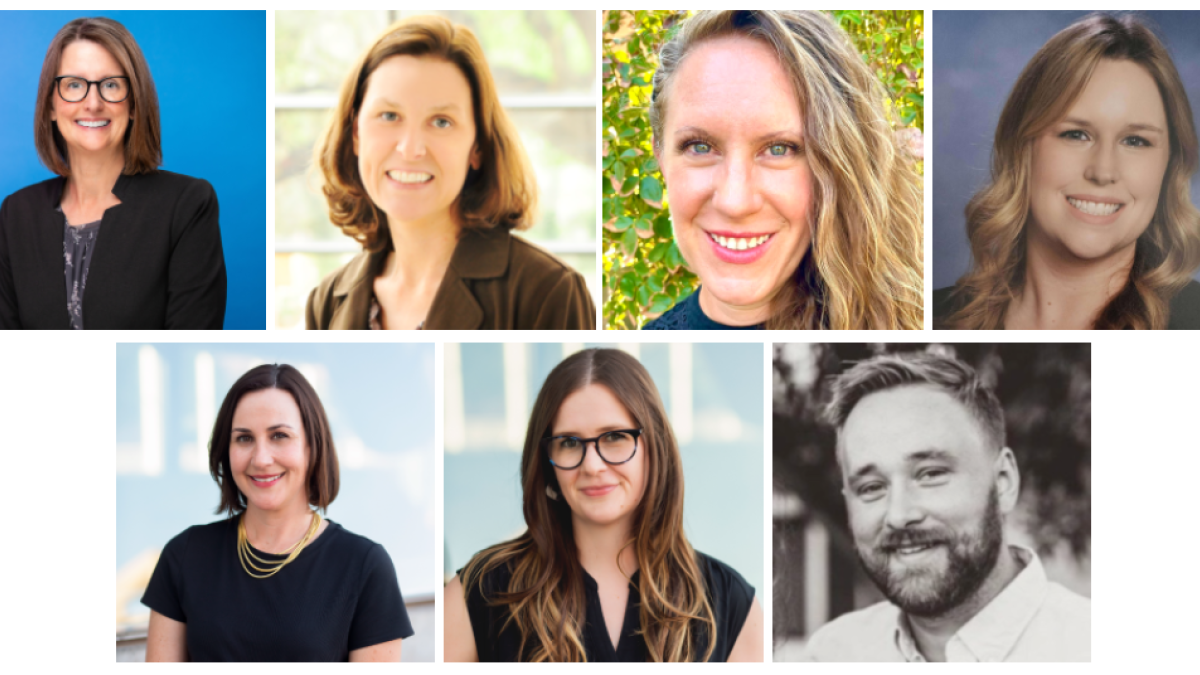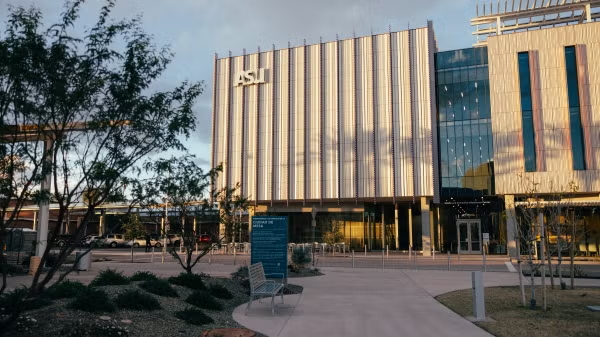ASU faculty collaborate on $1.6M grant to improve civics education in local schools

Top row, from left: Lauren Harris, Leanna Archambault, Tara Bartlett and Lindsie Spengler. Bottom row, from left: Kristy Roschke, Celeste Sepessy and James Dupey.
What do the School of Historical, Philosophical and Religious Studies, Mary Lou Fulton Teachers College and the Walter Cronkite School of Journalism and Mass Communication have in common? Improving Arizona public civics education for underserved students and their teachers.
Faculty from all three units jointly submitted a Department of Education grant proposal through the Arizona Board of Regents on behalf of Arizona State University. Twenty-five awards were granted for the 2023 fiscal year from across the country. The group from ASU was awarded $1.6 million over the course of three years for developing a program called Project ACCLaIM: Advancing Civics Curriculum Learning through Instructional Microcredentials.
Lauren Harris, associate professor of history education with a joint appointment in the School of Historical, Philosophical and Religious Studies and May Lou Fulton Teachers College, and Leanna Archambault, professor of learning design and technology in Mary Lou Fulton Teachers College, are co-pilots of the program and have formulated an A-team of faculty with specific roles in executing the project.
The team includes Lindsie Spengler, clinical assistant professor from Mary Lou Fulton, who will serve as project coordinator; James Dupey, clinical assistant professor of history, who will offer his expertise in online history education; Tara Bartlett, senior research analyst for ASU’s Participatory Governance Initiative at the School of Public Affairs, recent PhD graduate from Mary Lou Fulton and co-director of the Arizona Civic Coalition, who will serve as a content expert for civics education; and Kristy Roschke and Celeste Sepessy, teaching professors of journalism and mass communication, who will supply their expertise on media literacy through the News Co/Lab, an initiative housed within Cronkite that partners with news and community organizations to assist in providing media literacy resources. Roschke serves as director of the News Co/Lab and Sepessey as program manager.
“I’m thrilled to be working with an interdisciplinary team of super-talented individuals from history, journalism and education, and the impact that together we can have on practicing teachers, especially since the majority of us have taught in K–12 classrooms,” Archambault said.
The project aims to develop a specialization in civics, history and media literacy for K–12 educators, including nine one-credit equivalent courses with “microcredentials,” which is defined by the National Education Association (NEA) as a “short, competency-based recognition that allows an educator to demonstrate mastery in a particular area.” Completion of a microcredential involves being awarded a digital badge, and in the case of Project ACCLaIM, awardees can choose to turn the microcredential and associated course into credits that would go toward a master’s degree in education.
“The digital nature of the professional learning we are designing also ensures wide accessibility, making it easier for educators to learn anytime, anywhere,” Archambault said.
When asked why this grant is important, Harris stressed the importance of the target audience of this project, which is to benefit underserved students. She explained that the Department of Education has a definition for “underserved student” that has several subgroups, including “student of color” and “a student who is living in poverty or is served by schools with high concentrations of students living in poverty.”
Harris also shared an article from the NEA titled "Teacher Shortage is ‘Real and Growing, and Worse Than We Thought,'" in which data results of a study conducted by the Economic Policy Institute (EPI) demonstrate that “students in high-poverty schools are more likely than their counterparts in low-poverty schools to have teachers who have less experience, fewer credentials and lack the educational background in the subject matter they are teaching.”
Harris also explained how this imbalance leads to the urgent necessity for Project ACCLaIM.
“Teachers who have been hired to teach history and social studies in these schools may not have had much coursework in history, civics and media literacy themselves or training in how to teach these subjects,” she said. “These are the teachers and schools that we want to reach with this project and provide flexible professional learning opportunities in these topic areas.”
Roschke echoed Harris’ enthusiasm for the initiative while also stressing the need for high-quality and accessible material.
“It's great to see growing demand to incorporate media literacy across the curriculum,” she said. “But for these efforts to be successful, teachers need training that is efficient, easily digested and effective. We are excited to build on the News Co/Labs's suite of media literacy courses with offerings specifically for K–12 educators."
For the first year of the grant, the team will focus immediately on teachers working in Mesa Public Schools — the largest school district in Arizona — with plans to expand the program throughout the state in the second and third year.
Another component of the grant proposal includes developing an online mentorship program for the teachers called the Professional Learning Network (PLN), which will ensure teachers are able to connect readily with ASU faculty as a bolster of support while completing the program.
“The No Child Left Behind era caused long-standing gaps in civics education and learning, and many current educators never experienced rigorous, high-quality history and civics learning experiences themselves,” Bartlett said.
It’s the team’s hope that providing mentorship through Project ACCLaIM will encourage teachers to stick with the courses and not lose sight of the importance of completing the program.
For more information on microcredentials and courses available through Project ACCLaIM, please contact lindsie.spengler@asu.edu.
More Arts, humanities and education

Exceeding great expectations in downtown Mesa
Anyone visiting downtown Mesa over the past couple of years has a lot to rave about: The bevy of restaurants, unique local shops, entertainment venues and inviting spaces that beg for attention from…

Upcoming exhibition brings experimental art and more to the West Valley campus
Ask Tra Bouscaren how he got into art and his answer is simple.“Art saved my life when I was 19,” he says. “I was in a dark place and art showed me the way out.”Bouscaren is an …

ASU professor, alum named Yamaha '40 Under 40' outstanding music educators
A music career conference that connects college students with such industry leaders as Timbaland. A K–12 program that incorporates technology into music so that students are using digital tools to…

